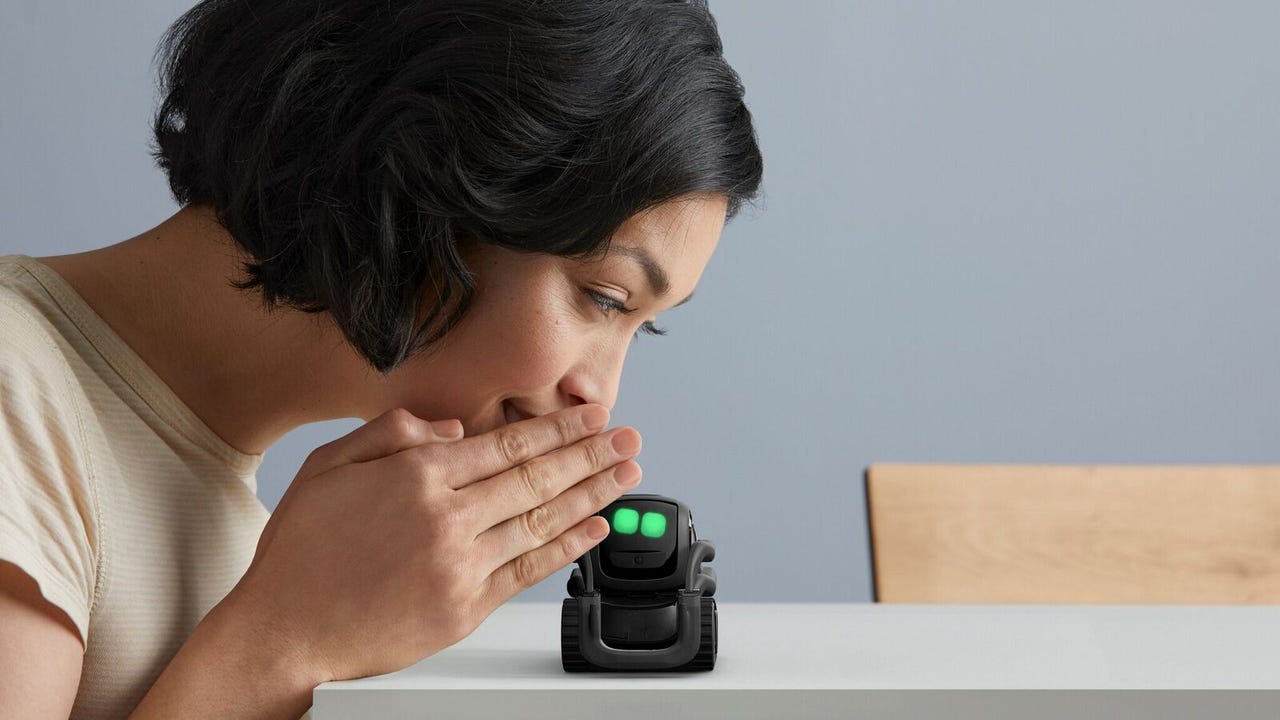Anki's delightful little robot is a step in the right direction for sidekick automation


I'm a home robotics curmudgeon. Want proof? Here's proof.
It's not that I fear the robot overlords or prefer to spend my steamy August evenings whittling reindeer figurines out of soap by lamplight. I'm pro robot, and I'm mildly confident automation will be a net positive in the next century (hear that, future overlords?).
Also: The robotics gold rush is in system-agnostic add-ons
What I'm not a fan of is technology for technology's sake, which is exactly what the current generation of so-called home or companion robots are.
Research may show that putting a face on an Amazon Echo, a la LG's Hub, enhances my emotional connection to it. But who says I care to have an emotional connection with an appliance? My stance is that the Echo does a decent job of solving my problems -- the largest being my inability to bark commands directly at my ancient stereo receiver -- and that no face is needed, thank you very much.
Bear that prickliness in mind when I say that Vector, the new companion robot from Anki, is not the home robot of your dreams.
But let me hasten to add that if you're going to shell out for any of the robotic toys half-heartedly masquerading as must-have home electronics, Vector would make a good choice. That assessment is based on three factors: form factor, fun quotient, and price.
Let's start with form factor. Vector looks a lot like a sleeker version of a previous Anki robot named Cozmo.
Featured
In a crowded field of educational robots, a space dominated by old favorites like Lego's Mindstorm and newer additions like Wonder Workshop's Dash & Dot, Anki's kid-programmable edu-bot manages to stand out by feeling like a real toy, something kids would actually want to play with.
The thing is a tiny bulldozer with two video screen eyes, which convey a remarkable range of expressions. Vector maintains Cozmo's bulldozer shape, and it's small enough to fit in the palm of your hand. Frankly, it looks ridiculous, not at all like a modern iProduct, and not even like more traditionally robotic-looking home robots like Kuri, which is as big as a waste bin.
(Kuri is an interesting case study, actually, a remarkably capable unit that didn't catch on with consumers. The announcement last month that parent Mayfield Robotics was halting production suggests people just aren't ready to have R2D2 roaming their homes.)
The ridiculousness is part of the fun with Vector, and also a nod to a fact that's underscored throughout Anki's promotional campaign: The home robots of science fiction just aren't here yet, but that doesn't mean we can't have some fun iterating.
Vector zips around like a cartoon character, which is no coincidence given that Anki brought on designer Dei Gaztelumendi as a character lead. "We generally want to find one defining feature and build from that," explains Gaztelumendi. "For Vector, Curiosity was a big one."
That fun factor is missing from a lot of other home robots precisely because they try to take themselves too seriously. If I'm not getting Rosie, I better be getting a goofball trick monkey that can make me laugh by going berserk when the pasta is done boiling.
Price is the other area where Anki wins. Vector is being rolled out on Kickstarter, which is a strategy I understand but am not wild about well-funded companies using. (Oh yeah, Anki is WELL funded ... to the tune of $200M thanks to a Series D backed by the likes of JP Morgan and Andreessen Horowitz.)
Still, discounts are great, and the price point via early bird Kickstarter backing is right, coming in at $199. If you're a big nerd who wants a fun robot companion, that seems like a reasonable outlay.
You'll notice that one area I haven't touched on is capability. That's because it's really not a differentiating factor.
Anki is touting Vector's cloud-powered neural network, cutting edge AI, and incredible sensor package. I have no doubt those are worthy of horn tooting among the most discerning tech aficionados.
But in actual practice -- which is to say, in the hands of 99 percent of potential customers -- Vector is (drumroll please) as functional as an Amazon Echo.
It's the same story with all the home robots right now: Incredible hardware, exquisite AI and sensing capabilities, true feats of creativity and engineering ... but at the end of the day these things are just going to be used to tell jokes, change songs, and look up the weather, because that's what they're best at.
(And man, we must really be pining for a novel new way to check the weather if you take the promotional materials from just about every one of these robotics companies to heart.)
Vector is available for pre-order on Kickstarter. This author's curmudgeonliness aside, it's worth checking out.